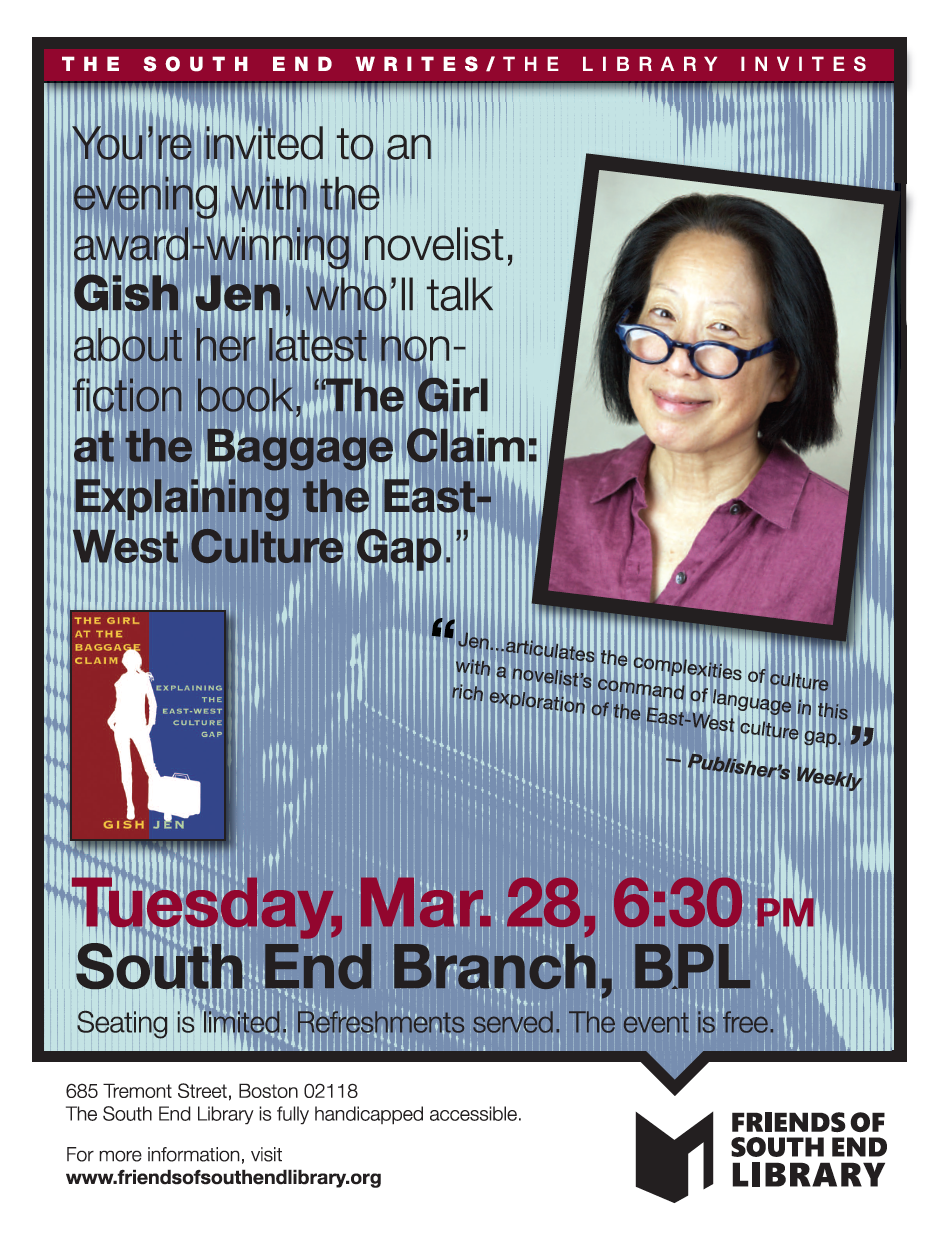In a recent interview with Jim Braude and Margery Eagan on WGBH radio, author Gish Jen commented on efforts by the show’s previous guest, Police Commissioner Bill Evans, to attract more Asians to the Boston police force. Jen, whose humorous view of life’s perplexing questions shines through much of her work, half-jokingly confessed on the show that she briefly considered becoming a police officer (“It’s a great day job”) but quickly added that not just her editor’s apoplexy would stand in the way but also the Police Department’s physical exam, which requires applicants to scale a five-foot wall. It would be a barrier, she said, “for those of us who are only five feet tall.” These human differences between East and West, of size, perception and approach to the communities we live in, have been the literary domain of Jen since she first dropped out of the Stanford Business School and entered the University of Iowa’s Writers’ Workshop in the 1980s.
Now an acclaimed novelist, and the author of The Girl at the Baggage Claim: Explaining the East West Culture Gap, Jen drew a full room of people to the library on March 28, eager to hear her take on the divergent views between East and West and the importance of the individual versus the society he or she is a part of. Jen, the winner of numerous prestigious awards and fellowships who has written five novels and two non-fiction books on the East-West cultural divide, suggests that, in the West, the individual sees the path to achievement and success as inextricably linked to the core self, as if it were a “sacred avocado pit” to which one must remain true; it is second in importance to the needs of community or family. It is seen as a universal value in the West, even though in most of the rest of the world a more communal view of individual achievement prevails: the idea of a “flexi-self” tends to be the norm, and the ideal place to be is part of a group which, in turn, is associated with a sense of wholeness.
Gish Jen patiently signing copies of her book for her admirers, including some who drove in from New Hampshire through pouring rain.
To illustrate her point, Jen showed two short videos, one a monologue by a young American man talking about watching video games where the story plot celebrates male fighters surviving in a world where “everyone is screwing you,” a profoundly anti-establishment message, Jen pointed out. The second video was produced not too long ago in reaction to an incident at Columbia University, where a group of Chinese students found their name tags ripped off their dorm doors one morning. Titled “Say My Name,“ each student described what their Chinese names meant in English. “My parents had great hopes for my future,” said one student whose Chinese name translated as Brightest Star in the Night Sky. “My name reminds me of my roots,” said another, “the place where I came from, each time I say my name.”
Other examples of the East-West divide include the true story behind the title of Jen's book where the proverbial girl at the baggage claim, who turned out to be the sister of a young Chinese woman accepted at Milton Academy, showed up to take her place at the school, instead. The incident led to accusations of fraud and caused changes in admissions rules at secondary schools. While Jen did not endorse the practice of attending a school impersonating a sibling, she explained that in Eastern cultures it is ok to help a family member because it benefits the group, even though it is seen as clumsy and wrong in the West, where individual achievement is preeminent. The extreme focus on personal success has other negative consequences, Jen suggested, including for the American unemployed, for example, who believe not having a job is “their fault.” In Israel, she said, which is a more communally oriented society, being unemployed is blamed on “the system.”
Herself the daughter of Chinese immigrants, Jen said she noticed that in the world of sports, winners of Olympic medals from the West tend to describe their individual achievements as “showing what I could do,” while non-Western winners generally make a point of thanking their coaches, friends and family, emphasizing, “I didn’t do it alone.” Jen, whose first book about the East-West cultural divide, Tiger Writing: Art Culture and the Independent Self, is based on the prestigious Massey Lectures she gave at Harvard University in 2012, made a point of complimenting New England Patriot football quarterback Tom Brady for consistently crediting his team for his achievements, even as it earned him the accusation of practicing ‘false modesty.’ “No false modesty,” she said, “He’s just Asian.”
Jen's earlier novels, Typical American, Who Is Irish?, The Love Wife, Mona in the Promised Land and World and Town (winner of the 2011 Massachusetts Book Prize) were widely praised for their often hilarious but also profound and warm descriptions of Chinese-American families adjusting to suburban life and the racial and religious divides they navigate. A contributor to The New Yorker and The Atlantic Monthly, Jen’s work has been included in The Best American Short Stories of 1988, 1995 and 2013, as well as The Best American Short Stories of the Century, edited by John Updike. Nominated for a National Book Critics’ Circle Award and an International IMPAC Dublin Book Award, Jen was elected to the American Academy of Arts and Sciences in 2009. She has been awarded a Lannan Literary Award for Fiction, a Guggenheim fellowship, a Radcliffe Institute for Advanced Study fellowship, and numerous other awards. In 2003, an American Academy of Arts and Letters jury comprised of John Updike, Cynthia Ozick, Don DeLillo, and Joyce Carol Oates granted her a five-year Mildred and Harold Strauss Living award.





